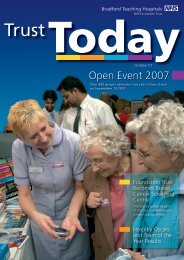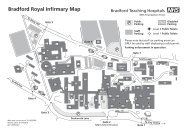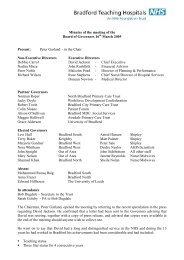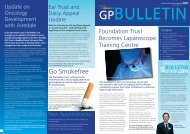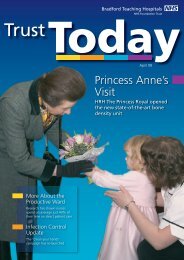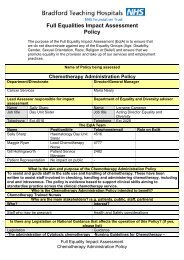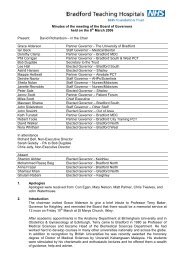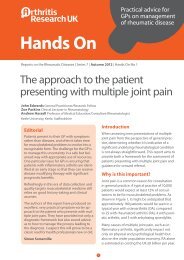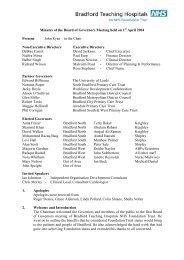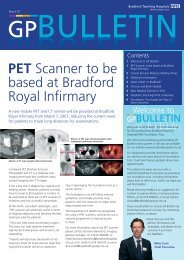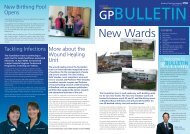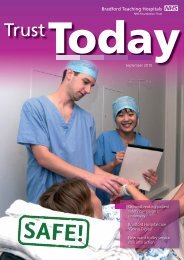The BTHFT DXA service - Bradford Teaching Hospitals NHS ...
The BTHFT DXA service - Bradford Teaching Hospitals NHS ...
The BTHFT DXA service - Bradford Teaching Hospitals NHS ...
You also want an ePaper? Increase the reach of your titles
YUMPU automatically turns print PDFs into web optimized ePapers that Google loves.
<strong>The</strong> <strong>Bradford</strong> <strong>Teaching</strong> <strong>Hospitals</strong> <strong>NHS</strong> Foundation Trust’s <strong>DXA</strong> Service<strong>Bradford</strong> <strong>Teaching</strong> <strong>Hospitals</strong> have been offering a <strong>DXA</strong> <strong>service</strong> since 1991. <strong>The</strong><strong>service</strong> is run by a highly qualified and experienced team, led by the clinical lead Dr K BSokoll, Consultant Rheumatologist and the senior <strong>DXA</strong> technician, Jane Threlkeld. Weprovide detailed and individualised reports based taking the patients risk factors and fracturerisk into account. We perform an average of 4700 scans per year.General information and location of our <strong>DXA</strong> scanner:Since 2006 we have been using a Hologic Discovery A scanner, which has arotating ‘C arm’, allowing lateral vertebral fracture assessments without the need to moverotate patient from supine to lateral position.<strong>The</strong> scanner is located in the x-ray department at St Luke’s hospitalHow do we acquire and report a <strong>DXA</strong> scan?Patients attending for <strong>DXA</strong> scan are asked to fill in a questionnaire about risk factorsfor low BMD, relevant past medical history, past and current treatments for osteoporosis aswell as other bone relevant medication. Height and weight are measured and a <strong>DXA</strong> scanperformed by the duty technician.All <strong>DXA</strong> scans are reviewed for accuracy prior to reporting by one of the seniortechnicians.Reporting is undertaken by the advanced reporting technicians if the scan is withinthe agreed reporting protocols. <strong>The</strong> more complex scans are being reported by therheumatology clinicians, mainly by Dr Sokoll.<strong>The</strong> reporting protocols are based on current evidence/guidance and are reviewedannually.<strong>The</strong> <strong>DXA</strong> team receives regular updates and training and regular clinical audit toensure consistency in scan standards, technique, and image quality and report accuracy ismaintained.
Why should repeat scans be done on the same scanner?Only performance of a follow up <strong>DXA</strong> scan on the same scanner allows calculation ofthe rate of change in BMD.Who to contact in case of queries?For referral queries:<strong>DXA</strong> UnitRadiology Dept, St Luke’s Hospital, Little Horton Lane, <strong>Bradford</strong>, BD5 0NATel. 01274 383782 Fax. 01274 383781Jane.Threlkeld@<strong>BTHFT</strong>.nhs.ukFor any queries regarding a <strong>DXA</strong> report:For technical querieso Contact the <strong>DXA</strong> team as aboveFor queries regarding the interpretation or medical management adviceo If you use system one• Suggest e-consult to reporting clinician oro Ring reporting rheumatology consultant (Contact details on <strong>BTHFT</strong> website)or<strong>The</strong> <strong>BTHFT</strong> <strong>DXA</strong> Team:Dr. Katharina Sokoll, MD, FRCP:Consultant Rheumatologist at BTFHT since 2006, with a special interest inosteoporosis and fracture prevention. Experience in management of osteoporosis/fractureprevention: Trained in Hull under Dr S Doherty in the metabolic bone unit (1999-2000) andDewsbury under Dr L Hordon, regional osteoporosis specialist and <strong>DXA</strong> reporter (2003-2005). Completed ISCD Clinician <strong>DXA</strong> reporting course 2009 and ISCD ISCD VertebralFracture Assessment Course in 2009.Lead Clinician for <strong>DXA</strong> <strong>service</strong> <strong>BTHFT</strong> since 2006. Active member of <strong>Bradford</strong> andAiredale Osteoporosis CAG since 2006 and the regional osteoporosis special interest groupsince 2010. Professional member of the National Osteoporosis Society since 2006.Jane Threlkeld BSc Hons:<strong>DXA</strong> Section Manager and advanced <strong>DXA</strong> reporting practitioner. Jane has worked in<strong>DXA</strong> field since 1997, initially at the Metabolic Bone Unit in Sheffield, performing andanalysing both routine <strong>DXA</strong> scans and Lateral Vertebral Assessments for screening scans,clinical indications and research with Prof. John Kanis and Prof. Eugene McCloskey, bothinternational experts in osteoporosis. Since 2002 Senior <strong>DXA</strong> technician at <strong>BTHFT</strong>.Completion of the National Training Scheme for Bone Densitometry by the Nationalosteoporosis society in 2002, the ISCD Bone Densitometry Course 2009, the ISCD ClinicianReporting Course 2009, the ISCD Vertebral Fracture Assessment Course 2009, the DerbyUniversity Masters module ‘<strong>DXA</strong> Reporting for Clinicians’ in 2010. Produces and reports aproportion of the <strong>DXA</strong> reports using agreed protocols, with on-going audit and professionaldevelopment under an ‘Advance in Practice’ role. Also active member of <strong>Bradford</strong> andAiredale Osteoporosis Clinical Advice Group since 2006, the regional falls group and aprofessional member the National Osteoporosis Society since 2002Christine Kay:Senior <strong>DXA</strong> Technician and advanced <strong>DXA</strong> reporting practitioner. Christine hasworked in the <strong>Bradford</strong> <strong>Teaching</strong> <strong>Hospitals</strong> <strong>DXA</strong> unit since it was first opened in 1991 and inthat time has worked tirelessly to promote and advance the <strong>service</strong>.



